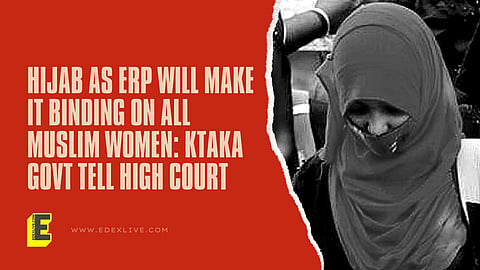

Would a declaration of hijab as an Essential Religious Practice (ERP) under Article 25 of the Constitution make it binding on every woman who follows Islam? This was the claim made by Advocate General Prabhuling Navadgi before the full judge Bench of the Karnataka High Court as he defended the state's GO issued in the backdrop of the hijab controversy in a PUC College in Udupi.
"This is a case where petitioners alone haven't come seeking relief for themselves. They are seeking a declaration of a particular dress format to become part of religious sanction so as to bind every woman who follows Islamic religion. That is the seriousness of the claim. Every woman who follows the Islamic faith is required to wear a hijab as a religious sanction is a claim made by them by way of relief," said the AG to the three-judge Bench comprising of Chief Justice Ritu Raj Awasthi, Justice KS Dixit and Justice AM Khazi.
The Advocate General said that in order to pass the test of being declared an ERP, the practice of hijab must pass six tests. He compiled these tests based on past judgments and observations from the Supreme Court over the years and included citations from the Indian Young Lawyers Assn vs State of Kerala, 2018 (Sabarimala temple case), the Shayara Bano vs UoI, 2017 (Triple Talaq case) and The Durgah Committee, Ajmer vs Syed Hussain Ali And Others, 1961 case.
"The burden rests upon them (the petitioners) with these principles that the honorable Supreme Court has evolved to show that this particular practice is fundamental in nature, that if not followed will change the nature of the religion, if this practice preceded the birth of the religion, if this practice is binding in nature and, if not followed, one will cease to be a part of the religion," submitted the AG.
He added that the petitioners should have shown discretion in seeking declarations from a constitutional court in a case where it can be potentially binding to so many people.
The state was asked, once again, by the court as to why there was a need to mention Article 25 and hijab in its GO at all if it is innocuous in nature. The AG said that the state has left it up to the discretion of the institutions to allow or disallow the hijab. "The state has only said that the students should follow the uniform prescribed by the institution," he said.
Complete autonomy to institutions to decide on uniforms
The court asked if the state would have no objection if the institution permits the hijab. The AG said, "Whether it permits or prohibits, we will take a decision then," to which the Chief Justice said, "No, you must make your stand clear. The petitioners have said that the hijab in the same colours as that of the uniform has been permitted by the college. Is the government okay with it? They wear dupatta as part of the uniform. Can they wear it over their heads?"
"The order gives complete autonomy to the institution to prescribe uniforms. As a matter of principle whether students should be allowed to wear clothes of religious symbols, the preamble of the Karnataka Education Act 1983 said the endeavour is for educational institutions to be secular," submitted the AG.
The court then asked if it is required to go into constitutional questions if that is the state's stand. That is when the AG said that in case an institution prohibits the hijab and students then say that they are violating Article 25, that is when it needs to be clear whether the court thinks the hijab is considered an essential religious practice under Article 25 or not. "The court assumes significance in this matter. The government has stayed consciously innocuous. The controversy would not have arisen if the petitioners had said, 'let us wear hijab as part of the dress'. Instead, they said, 'let us wear it as a religious symbol'. That question has to be decided today," added the Advocate General.
State will look into excesses under the interim order
The AG also mentioned the application submitted by Advocate Mohammed Tahir which claimed that the interim order banned students from schools and PU colleges that have prescribed uniforms from wearing any additional religious symbols including hijabs and saffron shawls. He said that he has spoken to the Principal Secretary of the Education Department and that a meeting will be convened soon. "I assure the court that our report will be submitted to the court and to Adv Tahir," said the AG.
